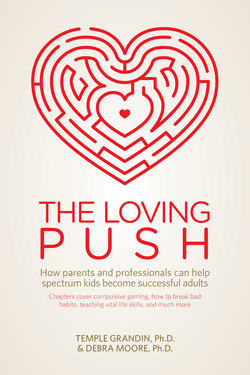Читать книгу The Loving Push - Debra Moore PhD - Страница 7
На сайте Литреса книга снята с продажи.
ОглавлениеINTRODUCTION
By Debra Moore, Ph.D.
Our children on the spectrum are growing up. According to Drexel University’s National Autism Report, about 50,000 kids with autism exit high school each year in the U.S. About a half million youth with autism will enter adulthood over the next decade. This book springs from our passion, aspirations, and hopes for these teens and young adults.
We want to increase the odds that your child grows into an adult with a rewarding, meaningful life. We want them to live at their highest and best capacity. We support them in defining and achieving an individualized and productive definition of success and satisfaction. We hope they have the opportunity to express their unique perspectives, personalities, and strengths. To achieve these goals, they need mentors, guidance, and support. They also need structure, appropriate expectations, and frequent “loving pushes.”
We believe that parents, professionals, and community members can greatly influence the odds of this next generation’s success. We can all help guide and inspire our children to become adults with meaningful, productive lives. And if we succeed, everyone stands to greatly benefit.
Throughout history, many of our planet’s most revolutionary advances have resulted from the unique perspectives, brilliance, and creativity of those on the autism spectrum. Einstein’s theory of relativity and Henry Cavendish’s groundbreaking theories on the properties of electricity and heat are two striking examples. Less conspicuous, but equally meaningful, workplaces, community organizations, and families have been enhanced by the exemplary dedication, focus, and loyalty of autistic adults.
From each of our unique perspectives, we’ve witnessed children and teens on the spectrum take a variety of paths as they reach adulthood. We have seen some lives wasted or lived below their true potential. Some teens remain unemployed and living at home, even though they are intelligent and capable of making a contribution. They have not learned the vital skills needed to navigate the adult world. Too many are languishing in bedrooms, in front of their computer, compulsively playing and replaying online video games.
It doesn’t have to turn out this way. Both of us have witnessed many youth on the spectrum find productive and meaningful adult lives. Their journeys came in endless varieties, but had several factors in common. The outcomes didn’t happen by luck, and the successes didn’t happen without the help of others. Wise adults, who provided guidance, nurturance, and direction, influenced them. Most importantly, they were exposed to opportunity. Their accomplishments were the result of persistence and hard work by both the child and others. And they followed a vital rule. Each child and teen built a foundation of practical, real-world skills, and then they found a niche that fit their own personal strengths, passions, and ways of thinking.
As a parent, your aim is to build both your child’s character and competency. You have been attempting that since they were little. If your “child” is now a teen or even an adult, they need you in new ways. Many times in the past, they’ve needed you to protect them. Now it’s time for a loving developmental push. It’s time for new skills on both their end and yours.
Transitioning from adolescence into adulthood brings both unfamiliar challenges and unique opportunities. We want to give parents of younger children pre-emptive help so they can start now to best prepare for the years ahead. For parents of older children, we want to give you information you can use right now to increase the odds of a successful transition to adult life. With more and more young adults on the spectrum entering adulthood every day, we don’t have time to lose.
First, we’ll introduce you to the real stories of some men and women on the spectrum. Ranging in age from 18 to 57, they haven’t always had an easy time of it. Parents or other special people in their lives provided support, opportunity, and guidance. They are now creating meaningful adult lives that embrace and accentuate their unique strengths and passions. Details of the journeys they and their families took will be used throughout the book to help you better envision keys to your child’s success.
We’ll then tell you how to help your child have a positive mindset. We’ll also help you recognize potential minefields and how to work around them. We’ll give you concrete examples showing how to teach your teen specific skills they’ll need in the real, adult world.
The individuals profiled here may or may not resemble your child. Autism is by definition a disorder that occurs along a spectrum, and therefore affects everyone differently. It can result in a wide range of challenges and strengths. Other diagnoses, such as ADD/ADHD, often accompany ASD or are mistaken for ASD due to similar behaviors. Don’t get too caught up in labels. If you recognize aspects of your child in this book, take the ideas and recommendations and run with them.
No matter what age your child is, or what label they have, it’s important to remember that what abilities you see today may not be what you see tomorrow. Adult “success” comes in many flavors, just as each child does. The common denominator is a life lived to one’s own unique, full capacity. Success is not measured or determined by IQ, verbal fluency, or physical ability.
Success is steered by hope, determination, and discovery. Not every child will end up where the individuals profiled here did, and that’s not the point. But all children should have hopes and dreams, and the opportunity to choose and lead meaningful and satisfying lives. With the support, intervention, and “loving pushes” of family and others, these dreams can come true.
